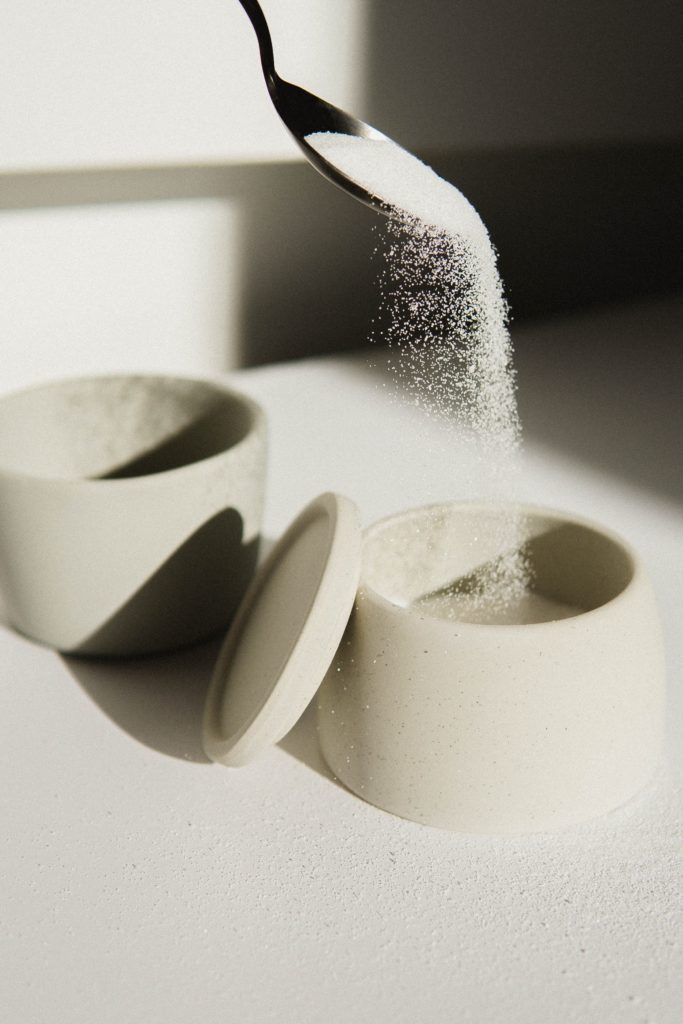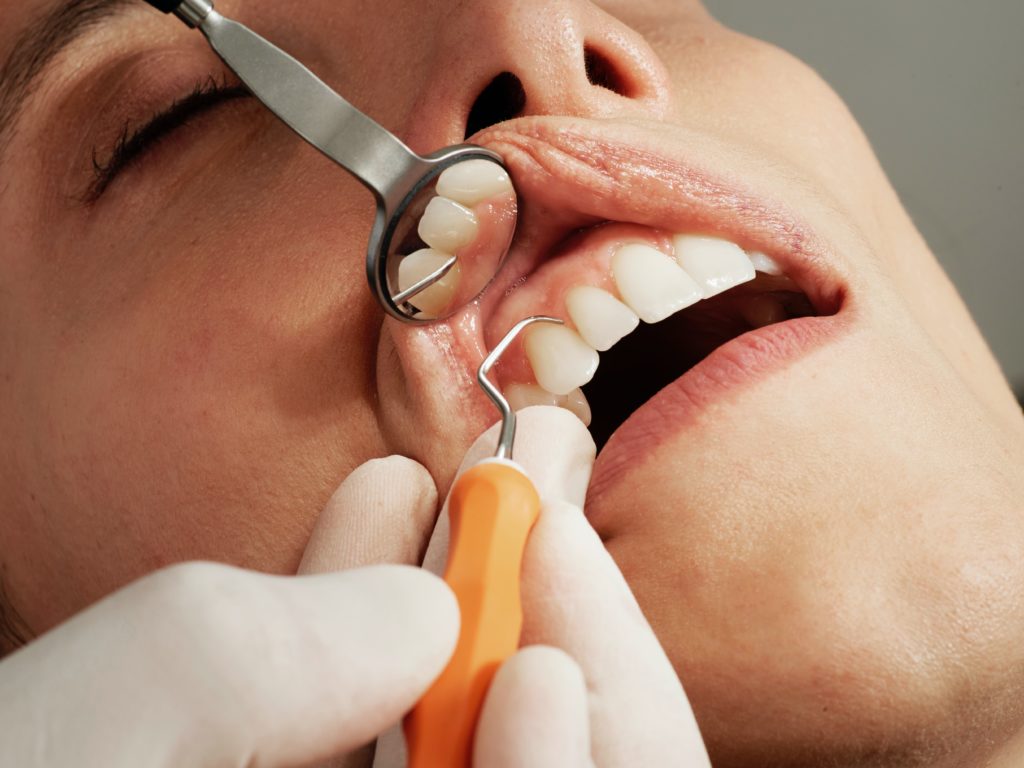
The ancient Greek philosopher Aristotle first observed that sugary foods like soft figs caused tooth decay but nobody believed him at the time!
Thank goodness we know better now. Let’s take a look at the harm sugar can have on your oral health and how to prevent damage.
What is a Cavity & What Causes it?
Many different types of bacteria live inside the mouth. Some are beneficial to your dental health. Others are harmful. For example, studies have shown that a select group of harmful bacteria produce acid in your mouth whenever they encounter and digest sugar.
These acids remove minerals from the tooth enamel, which is the shiny, protective, outer layer of your tooth. This process is called demineralisation. The good news is that your saliva helps to constantly reverse this damage in a natural process called remineralisation.

The minerals in your saliva, such as calcium and phosphate, in addition to fluoride from toothpaste and water, help the enamel repair itself by replacing minerals lost during an “acid attack.” This helps strengthen your teeth.
However, a repeated cycle of acid attacks through sugar intake weakens then destroy the enamel. This creates cavities.
Simply put, a cavity is a hole in the tooth caused by tooth decay. If left untreated, the cavity can spread into the deeper layers of the tooth, causing pain and possibly, loss of the tooth.
The warning signs of tooth decay include:
- Toothache
- Pain when chewing
- Sensitivity to sweet, hot or cold foods and drinks.
| SUMMARY Your saliva works to protect your mouth from cavities but when you ingest too much sugar, you weaken the tooth. This creates tooth decay & cavities. |
Dietary Habits that cause Tooth Decay
1. Consuming High Sugar Snacks
Think before you reach for that sugary snack. Many studies have found that the frequent consumption of sweets and sugary drinks leads to cavities.
Frequent snacking on foods high in sugar increases the amount of time your teeth are exposed to the dissolving effects of various acids, causing tooth decay.
One recent study among school children found that those who snacked on cookies and potato chips were four times more likely to develop cavities than children who did not. Cavities are a common pediatric dental emergency that we can easily treat but it’s always better to take preventative measures to monitor how many sweets children consume.

2. Sensitivity to Hot or Cold
Do you experience sensitivity when drinking either hot or cold beverages? This is an indication of an infected nerve in one of your teeth.
Some people simply have sensitive teeth and experience slight discomfort from heat and cold. If this is this case, you’ll likely feel sensitivity throughout your entire mouth. This discomfort is subtle and subsides quickly.
However, if you have an infection, the sensitivity is much more focused. Pay attention to the area you’re experiencing discomfort. If the pain is always around the same tooth, you may need a root canal.
3. Swollen Gums
Inflammation of the gums is very common. A number of oral problems can cause it, including gum disease, food getting stuck in the gum line, or oral injury. However, if you notice swollen gums at the base of a particular tooth, there may be a bigger issue. This could be an indication of an infection.
If an infection is present, you’re likely to notice sudden inflammation. During other oral problems such as gingivitis, the swelling is gradual and widespread.
Once you notice swelling, keep an eye on it. If it doesn’t disappear in a week’s time, you should see a dentist. If you notice pain around the swollen gums, you may need a root canal.
4. Sores on Your Gums
Many people experience canker sores on their gums as a result of acidic foods or hot beverages. These are relatively common and will go away on their own. However, the bacteria that accompany an infection can also cause sores on your gums. These are more like pimples beneath the surface of your gum line.
These sores, which are very similar to pimples you get on your face, are white bumps containing bacteria. If they’re a result of an infected tooth, you’ll notice them reoccurring in the same area. You may also notice pain in the area where the pimples appear.
If gone untreated, these sores can increase in size. You may also notice a foul taste, which is a result of the bacteria entering your mouth.
5. A Chipped Tooth

If you’ve experienced an oral injury that resulted in a chipped tooth, you may be at a higher risk of infection. This is because bacteria can easily access the softer tissue located deeper in the tooth.
A chipped tooth can happen as a result of something serious like a sports injury or something minor like biting down on hard foods. Even if the chip is very small, the tooth is more susceptible to infection.
This is why it’s important to have a chipped tooth repaired by a dentist right away. If fixed, you’ll avoid possible infection.
Don’t ignore a small chip just because there’s no pain. Because the nerve of the tooth is now more vulnerable, over time it may become infected.
6. Discolouration
Tooth discolouration can result from a number of things. Poor oral hygiene and staining from coffee, tea or cigarettes are very common. So there is no need for instant alarm. However, the discolouration can also be the result of nerve damage. This occurs when the pulp of the tooth becomes discoloured due to the infection located in the nerve. In this case, blood can actually enter the tooth and stain the pulp.
Cavities can also cause discolouration. It may be hard to see at first, but if a cavity goes untreated, it will spread and become more noticeable.
7. Prolonged Tooth Decay
Unfortunately, once you have a cavity (even a very small one) you can’t get rid of it on your own. Even diligent brushing and flossing won’t reverse the problem. A dentist must remove it.
If a cavity goes untreated for too long it will spread into the root and infect the nerve of the tooth. If this happens, a root canal and crown is your only option.
First, your dentist will perform the root canal to remove the infection. Then, after the cavity gets removed from the outer part of your tooth, they’ll apply a crown to protect it from future decay. This is why it’s important to have regular checkups and cleanings. Taking small steps to maintain good oral health will prevent bigger problems down the road.
If you have any concerns or questions, please don’t hesitate to contact us:
0 comments on “How Sugar Can Harm Your Teeth”